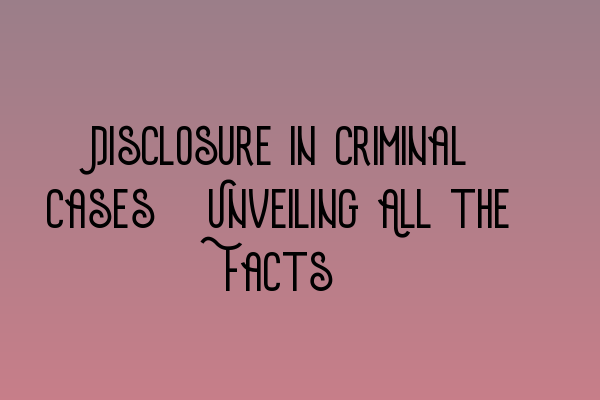Disclosure in Criminal Cases: Unveiling All the Facts
Welcome to the SQE Criminal Law & Practice Law UK blog! Today, we will delve into the important topic of disclosure in criminal cases. Disclosure is a fundamental aspect of the criminal justice system that ensures fairness and transparency. It allows both the prosecution and the defense to have access to all the relevant facts of the case. In this post, we will explore the key aspects of disclosure, its significance, and the challenges it poses.
The Importance of Disclosure
Disclosure plays a crucial role in criminal cases as it upholds the principles of fairness and justice. The disclosure obligations ensure that all parties involved in a case have access to the same information. This allows the defense to scrutinize the evidence presented by the prosecution and prepare an effective defense strategy.
In a criminal case, both the prosecution and the defense have a duty of disclosure. The prosecution must disclose all material evidence in its possession, including evidence that may be favorable to the defense. On the other hand, the defense must disclose any evidence that undermines the prosecution’s case or supports the defense’s position.
By ensuring full disclosure, the criminal justice system aims to prevent any miscarriage of justice and protect the rights of the accused.
Challenges in Disclosure
While the concept of disclosure is straightforward, its implementation can be challenging. There are several factors that contribute to the complexities of disclosure in criminal cases:
- Volume of Evidence: In complex cases, the amount of evidence can be substantial, requiring careful review and organization.
- Sensitive Information: Certain information may be sensitive or classified, posing a dilemma in terms of disclosure without compromising national security or confidentiality.
- Third Party Material: The involvement of third parties, such as expert witnesses or informants, can complicate the process of disclosure.
- Timeliness: Disclosure must be made in a timely manner to allow both sides to adequately prepare their cases.
To effectively address these challenges, the courts and legal professionals must employ efficient case management techniques and utilize technology to streamline the disclosure process.
Disclosure and the SQE Exam
Understanding the principles and practical aspects of disclosure is crucial for aspiring solicitors. The Solicitors Qualifying Examination (SQE) assesses candidates’ knowledge and skills in various areas of law, including criminal law and practice.
If you are preparing for the SQE exam, it is essential to study the relevant materials. You can find comprehensive study materials for aspiring solicitors on our website: SQE Exam Prep: Essential Study Materials for Aspiring Solicitors.
Conclusion
Disclosure is a cornerstone of the criminal justice system, ensuring fairness and transparency in criminal cases. It allows all parties involved to access the relevant facts and evidence, enabling them to present their cases effectively. While disclosure may present challenges, it is essential for upholding the principles of justice.
For more information about the SQE exam format and other relevant topics, check out our related articles:
- Demystifying the Solicitors Qualifying Examination Format
- SQE Exam for International Lawyers: Challenges and Success Strategies
- LLC Formation Made Simple: Step-by-Step Guide for UK Entrepreneurs
- LLC Formation: A Step-by-Step Guide for UK Entrepreneurs
Thank you for reading our blog post on disclosure in criminal cases. Stay tuned for more informative articles!
